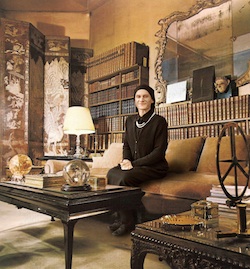By Charlene Kahn , Special to JTNews
“A rumination on the preservation of history: who records it and why? What drives its documentation? Is it objective truth, or the personal motive of the historian?”
These questions were penned by the playwright Doug Wright during the process of writing I Am My Own Wife. The struggle that took him 10 years gave him much in return: By the unusual method of inserting himself as a character, Wright found a way to tell the complex life story of Charlotte von Mahlsdorf, born in eastern Berlin in 1928 as Lothar Berfelde.
One year after the one-person, multi-character play with the curious title premiered on Broadway in 2003, Wright received the 2004 Pulitzer Prize for Drama and the Tony Award for Best Play. His work contains multiple layers of complexity, not solely that of von Mahlsdorf’s gender identity — the “third sex,” a woman trapped in a man’s body — but the character’s obsession for retrieving furniture and antiques tragically left behind by deported Jews during Hitler’s reign of terror.
Von Mahlsdorf penned a story about her life, I Am My Own Wife: The True Story of Charlotte von Mahlsdorf, which was published in 1995. She died in 2002.
Wright called von Mahlsdorf a hoarder of history, though the post-unification German government gave the hoarder a merit award for preserving an entire Weimar-era tavern, the Mulack-Ritze. Further complexities within this story of survival abound, through family abuse, the Nazi and post-Nazi era, through the Communist East German regime and into a reunified Germany. Given the adventures she had throughout her life, Von Mahlsdorf could have been a more truthful caper for an episode of the original Mission: Impossible TV series.
Seattle Repertory Theatre is staging I Am My Own Wife, directed by Jerry Manning. Seattle actor Nick Garrison plays the key role — or roles — as he represents more than 30 characters.
For Seattle native Garrison, it looks like he’s found his métier. Called “Mr. Personalities, a one-of-a-kind performer who’s found his voice” by Seattle Met magazine, Garrison played Master of Ceremonies in 5th Avenue Theatre’s production of Cabaret in 2008 and performed in the off-Broadway production of Hedwig and the Angry Inch. Growing up in Seattle, Garrison acted in productions at The Northwest School and studied voice with Emilie Berne before leaving for Europe and later New York. According to Seattle Rep’s Katie Gottlieb Jackman, Manning, the Seattle Rep’s artistic director, hand-picked Nick Garrison for the one-person role.
Manning met Wright in 1995, when Manning was casting director for New York Theatre Workshop, but “the timing didn’t match up until now,” Manning explained.
Manning’s and Garrison’s mutual enthusiasm for the play cut through Seattle’s three-day freeze: Calling in for their snow-day interview with JTNews, their mutual, straightforward passion, their connection with the play, and their emphatic respect for its author and its message prevailed.
“You can trust this script because it’s so finely written,” Manning said. “We are taking great pains to honor Doug’s choice of words.”
Questioned about the collecting of furniture — from the homes of deported Jews — both Manning and Garrison believed von Mahlsdorf’s intents were for purposes of good: “Charlotte was interested in the family and what that piece represented,” Manning said.
“The character’s acquisition of the furniture represents the families and the incredible loss during the war, and the impossibility of restoring it,” Garrison added.
The Grunderzeit Museum, a restored manor house, was created by von Mahlsdorf in eastern Berlin to hold collected furnishings of a past era, furniture left behind after its owners were taken by Nazis, and later collections rescued before mass urban demolition by the East German government.
Wright is gay and portrayed that part of his own persona in the script.
“The Jewish and gay community have a shared sense of exile and persecution and of being survivors,” Garrison said.
I Am My Own Wife may serve to remind its audience that regardless of differences, believing in justice, valuing the uniqueness of identity, and preserving what is beautiful may be the best way to learn from history.
